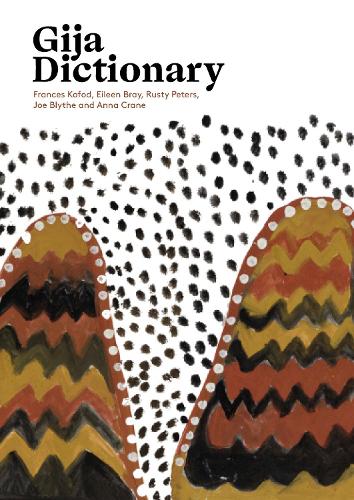
Gija Dictionary
(Paperback)
Publishing Details
Gija Dictionary
By (Author) Frances Kofod
By (author) Eileen Bray
By (author) Rusty Peters
By (author) Joe Blythe
By (author) Anna Crane
Aboriginal Studies Press
Aboriginal Studies Press
1st November 2022
Australia
Classifications
General
Non Fiction
Physical Properties
Paperback
430
Width 170mm, Height 240mm
Description
Gija is a traditional language of the East Kimberley in the north-west of Australia. It is a landscape of weathered hills hugged by spinifex, startling rocky outcrops, hidden waterholes and dry riverbeds that turn to raging torrents in the wet season. Gija country extends north of Warmun (Turkey Creek) in the upper reaches of the Ord and Dunham rivers, south to Halls Creek and west to Lansdowne and Tableland stations. The Purnululu (Bungle-Bungle Boornoolooloo) National Park sits in Gija country.
From the late 1800s, Gija people suffered devastating losses: invading pastoralists brought cattle that damaged waterholes and devastated the ecosystem; fortune hunters chased gold at Halls Creek; and government rounded up and forced people onto cattle stations. In the late 1960s when Aboriginal stockmen were granted equal wages, many were thrown off the land. This second wave of dispossession saw Gija people move to Wyndham and Halls Creek and later Warmun (Warrmarn), where most Gija people still live today. Many contributed to this dictionary including many well-known artists who use painting to pass on their linguistic knowledge.
Despite this tragic history of loss, Gija people remain on their country, living their culture and speaking language. This new dictionary of Gija, the most comprehensive ever published, is a testament to their resilience.
Author Bio
Frances Kofod has worked with Gija, Miriwoong and Gajirrabeng languages since the 1970s and has been involved in many Gija language and culture projects at Warrmarn (Warmun Turkey Creek), including helping establish Mirima Dawang Woorlab-gerring Language and Culture Centre in Kununurra (WA). Mr R Peters was born in 1935 at Balinyin, Springvale Station, in the East Kimberley. When young he learned Gija law in the bush. After he and other Aboriginal stockmen were forced to leave stations after the granting of citizenship and equal wages in 1967, Mr Peters began teaching Gija language at the Ngalangangpum School at Warmun and dedicated his life to passing on Gija culture.
